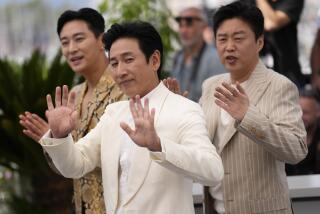Millions Captivated by Televised Probe Into Bloody 1980 Uprising : Kwangju Hearings Have South Koreans Spellbound
SEOUL — The 1980 Kwangju incident, a chaotic uprising in which about 200 South Koreans were killed by brutal military suppression, moved Friday from the murky realm of dissident rumors and campaign rhetoric to chilling historical record.
A National Assembly committee investigating the uprising began televised hearings, captivating millions of Koreans with a story of political martyrdom and official corruption.
The star witness was Kim Dae Jung, an opposition leader blamed by martial-law authorities at the time for inciting the people of Kwangju to rise up in rebellion.
Jailed and Exiled
Kim was sentenced to death for sedition but was released from prison, allowed to go into exile in the United States and ultimately permitted to return home and re-enter politics. Now, Kim heads the largest opposition party in an opposition-controlled National Assembly. On Friday, he faced the cameras under oath to accuse his old nemesis, disgraced former President Chun Doo Hwan, of masterminding the “Kwangju massacre.”
Televisions blared all over Seoul as crowds gathered in shops, restaurants, offices and bus stations to watch the testimony. Cab drivers kept their radios tuned to the broadcast. In the provincial capital of Kwangju, where emotions still run high, many companies, realizing that little work would get done, gave employees the day off.
“What they are saying now will be recorded as true history,” said Lee Byong Ha, 32, a trade agent who stopped to watch the testimony on a television set in a Seoul storefront window. “Of course, we’ve heard it all before, but we were told not to believe it by the government. This will set the record straight.”
In his testimony Friday, Kim said he believed that Chun and other generals provoked the revolt to allow them to seize power in the chaotic days that followed the assassination of President Park Chung Hee in 1979. Kim accused the United States “of taking a bystander’s role” in the uprising.
Although the official death toll in the uprising was 193, unofficial estimates put it at about 265.
Similar televised hearings held last week by another National Assembly committee investigating corruption in the Chun regime drew a peak 62% viewer rating--higher than the Summer Olympics, held in Seoul this year.
The Korea Herald reported that Friday’s broadcast set a record for viewership but did not report the figure. A series of related hearings, delving into such subjects as Chun’s purge of the media, are scheduled to continue for weeks, possibly months.
Chun, meanwhile, has ignored a summons to testify before the Kwangju committee and resisted mounting pressure to explain and apologize for alleged financial irregularities and abuse of power committed before he stepped down in February.
News reports Friday quoted aides to Chun as saying that the ex-president plans to make a public apology, turn over most of his wealth to the government and leave Seoul in an effort to quiet complaints about his alleged involvement in corruption. An aide said Chun will announce his decision at a news conference next week, but there has been no word from Chun himself on his plans.
The testimony concerning Kwangju, unfolding as hearings continue today and next week, may heighten the lynch-mob atmosphere already brewing.
“People eventually will believe that Chun was responsible for all this murdering,” said Kwon Young Hee, 38, a bookkeeper who worked on an abacus Friday with one eye on the television set in the corner of his office. “I think he must be dealt with under the law and that any kind of political pardon should be considered only later.”
One middle-aged housewife, though, had a more charitable view of Chun as she watched the televised hearing in her luxury apartment south of the Han River.
“I feel sorry for him,” said Kim Ryung Hon, who is married to an economist. “The final analysis is that Chun committed wrongdoings, but it was the Korean people who made him what he was. We must ask ourselves what we did to encourage and accelerate his crimes.”
Political Melodrama
Kim said she is already tiring of the political melodrama, which is the chief topic of discussion at her Wednesday “hobby club,” a group of women who do embroidery.
“I wish this would be over tonight,” she said. “It’s so unpleasant and depressing. We’re digging away at the scars and the sadness and the regrets and talking about remedies, but it’s all talk.”
However, Kim said she will tune in to the Kwangju hearings “as long as I’m home and have nothing better to do.”
More to Read
Sign up for Essential California
The most important California stories and recommendations in your inbox every morning.
You may occasionally receive promotional content from the Los Angeles Times.










